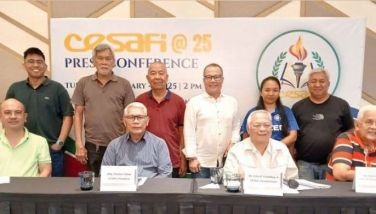Presenting PDIC nominee No. 2
April 21, 2004 | 12:00am
Here’s part two of our series on the questionable personalities that the Philippine Deposit Insurance Corp. (PDIC) has been anointing as representatives in some of the country’s top banks. If you would recall, I previously wrote about the growing concern of many from the banking industry on the PDIC’s increasing hold and influence over their sector.
So far, the PDIC has successfully gained control over PNB, UCPB and very recently, PBCom – using public funds. But that’s really not the main issue. More than the deposit insurance company’s gaining dominion in the industry, what’s causing many people to feel a little discomfort are the individuals that the company has been choosing to sit in these banks’ boards. I’ve been told that these PDIC-nominated directors are masters in harassing and controlling the innocent owners and officers of these banks.
After writing about the exploits of nominee number one in a previous column, I got wind from my BSP and PDIC sources that Mr. Nazareno has already resigned from his directorships in PNB subsidiaries. After having been reported to have interlocking positions in PNB and UCPB, Mr. Nazareno decided to quit, apparently, in the name of delicadeza. Good move, Mr. Nazareno.
We now move on to nominee number two. I’ll make you readers do a guessing game among yourselves on this one for my sources say he’s the "pikon" type. He doesn’t want his name appearing in negative write-ups. So let’s give him that. Just try to guess who he is.
Mr. PDIC anointee is known to be a very difficult person to deal with. Sitting as a director in a call center, he is described by some executives in the company as "so anal." He is the type who would raise hell and give senior executives under his wings a good scolding if they don’t pick him up from the airport. Now how trivial can one get?
He is also notorious for his punctuality record, arriving at top-level meetings one to two hours late. Once in, he loves doing some power tripping and reverses all the decisions that were made before he came in. No wonder, he caused some eyebrows to raise to high heavens and demoralized the people around him when he once berated one of his officers for – that’s it, coming to a meeting late! As one of the senior officers who witnessed the "scene" said, the poor executive was "di lang sinabon, kinula pa at binanlawan." Talk about a preacher who does not practice what he preaches!
But this is not the first time he embarrassed one of his officers in an executive forum. The way he badgered a pregnant woman in a board meeting was well written about in other gossip columns.
His notoriety is not limited though to his tardiness and bad temper. He is also known to have a big ego, a know-it-all, a credit grabber. When the bank he currently sits in as top banana was losing money, insiders say he was very quiet, silently sitting in his big chair in the boardroom. Now that the bank has turned around, no thanks to him, he orders people around, thinking everyone else is stupid and makes all the members of his team feel that he is God’s gift to that bank.
At another bank where he used to be president and CEO, he refused to give back the seat originally held by the owner/CEO who only passed on to him his position after he was appointed the country’s finance chief. After failing to get the Commission on Appointment’s nod, the finance czar had to step down and wanted his banking job back. After refusing profusely to vacate his post, the bank owners were only able to get rid of Mr. PDIC Appointee after giving him a handsome bye-bye package.
For someone who thinks so highly of himself, Mr. Appointee’s banking background leaves a lot to be desired. He is said to be the one behind RCBC’s credit card woes. Principally because of him, RCBC is suing Equitable PCI Bank, claiming that when it was buying Bankard from the latter, the company’s credit and receivables were bloated, overstated. This eventually caused RCBC credit card losses of about P500 million. It was later found that he okayed the transaction to buy the credit card firm without conducting due diligence. The same questions on overpricing are likewise being raised on his move to buy Capitol Bank.
With all of these issues being thrown at Mr. PDIC Appointee and some other personages being appointment to board level positions in the country’s biggest banks, it may help if people in the government start reviewing the PDIC’s appointment system – at least after the election fever subsides. The thought is that instead of providing corporate governance to those banks that need it, the PDIC is giving people who are turning out to be corporate nuisance.
Better roads mean better economic opportunities and higher growth levels.
Improvements to the road transportation system that reduce the time and costs of travel such as those introduced by tollways will cause people to travel more.
A study conducted by the UP Planning and Development Research Foundation noted that toll roads are well used in 18 developing and developed countries in the world. These countries include five with developing toll road systems (China, Indonesia, Malaysia, the Philippines, and Thailand); five with developed toll road systems (France, Italy, Japan, Spain, and the United States); and eight others (Argentina, Brazil, Chile, Colombia, Hong Kong, Hungary, Mexico, and the United Kingdom).
While some countries have historically avoided charging tolls for public roads, in the present environment of fiscal restraint, nearly all have turned to tolls as preferred means for financing highway infrastructure investment. Except for a few countries such as Japan, the private sector is now playing a major role in toll road development, the study noted.
One franchisee – the Philippine National Construction Corp. (PNCC) – has dominated the toll road arena. The perpetual financial crisis of the company since the 1980s indicated that it was never financially prepared to realistically advance plans for expansion or extension to the existing North Luzon Expressway (NLEX) or the South Luzon Expressway (SLEX) to effectively respond to government’s objective of increasing private sector participation in all aspects of infrastructure development.
The NLEX project is a strategic undertaking. It is located in the third most dynamic region in the country after the National Capital Region (NCR) and Region IV (Southern Tagalog).
As of 2000, the region’s population totaled more than eight million people representing 10.5 percent of the country’s total population. For the past 25 years, its population has been growing at an annual average growth rate of 2.62 percent, above the overall national growth rate of 2.42 percent. Region III is the second most densely populated area, next only to the NCR.
Along with the NCR, Southern Tagalog, and the Mindanao regions, it has served as one of the key catchment areas for internal migration from Northern Luzon, the Bicol region, and the Visayas for the past 25 years. (On Sunday, part two of this piece on the UP study will discuss more in detail the benefits of the NLEX to the provinces and the region.)
For comments, e-mail at [email protected]
So far, the PDIC has successfully gained control over PNB, UCPB and very recently, PBCom – using public funds. But that’s really not the main issue. More than the deposit insurance company’s gaining dominion in the industry, what’s causing many people to feel a little discomfort are the individuals that the company has been choosing to sit in these banks’ boards. I’ve been told that these PDIC-nominated directors are masters in harassing and controlling the innocent owners and officers of these banks.
After writing about the exploits of nominee number one in a previous column, I got wind from my BSP and PDIC sources that Mr. Nazareno has already resigned from his directorships in PNB subsidiaries. After having been reported to have interlocking positions in PNB and UCPB, Mr. Nazareno decided to quit, apparently, in the name of delicadeza. Good move, Mr. Nazareno.
We now move on to nominee number two. I’ll make you readers do a guessing game among yourselves on this one for my sources say he’s the "pikon" type. He doesn’t want his name appearing in negative write-ups. So let’s give him that. Just try to guess who he is.
Mr. PDIC anointee is known to be a very difficult person to deal with. Sitting as a director in a call center, he is described by some executives in the company as "so anal." He is the type who would raise hell and give senior executives under his wings a good scolding if they don’t pick him up from the airport. Now how trivial can one get?
He is also notorious for his punctuality record, arriving at top-level meetings one to two hours late. Once in, he loves doing some power tripping and reverses all the decisions that were made before he came in. No wonder, he caused some eyebrows to raise to high heavens and demoralized the people around him when he once berated one of his officers for – that’s it, coming to a meeting late! As one of the senior officers who witnessed the "scene" said, the poor executive was "di lang sinabon, kinula pa at binanlawan." Talk about a preacher who does not practice what he preaches!
But this is not the first time he embarrassed one of his officers in an executive forum. The way he badgered a pregnant woman in a board meeting was well written about in other gossip columns.
His notoriety is not limited though to his tardiness and bad temper. He is also known to have a big ego, a know-it-all, a credit grabber. When the bank he currently sits in as top banana was losing money, insiders say he was very quiet, silently sitting in his big chair in the boardroom. Now that the bank has turned around, no thanks to him, he orders people around, thinking everyone else is stupid and makes all the members of his team feel that he is God’s gift to that bank.
At another bank where he used to be president and CEO, he refused to give back the seat originally held by the owner/CEO who only passed on to him his position after he was appointed the country’s finance chief. After failing to get the Commission on Appointment’s nod, the finance czar had to step down and wanted his banking job back. After refusing profusely to vacate his post, the bank owners were only able to get rid of Mr. PDIC Appointee after giving him a handsome bye-bye package.
For someone who thinks so highly of himself, Mr. Appointee’s banking background leaves a lot to be desired. He is said to be the one behind RCBC’s credit card woes. Principally because of him, RCBC is suing Equitable PCI Bank, claiming that when it was buying Bankard from the latter, the company’s credit and receivables were bloated, overstated. This eventually caused RCBC credit card losses of about P500 million. It was later found that he okayed the transaction to buy the credit card firm without conducting due diligence. The same questions on overpricing are likewise being raised on his move to buy Capitol Bank.
With all of these issues being thrown at Mr. PDIC Appointee and some other personages being appointment to board level positions in the country’s biggest banks, it may help if people in the government start reviewing the PDIC’s appointment system – at least after the election fever subsides. The thought is that instead of providing corporate governance to those banks that need it, the PDIC is giving people who are turning out to be corporate nuisance.
Improvements to the road transportation system that reduce the time and costs of travel such as those introduced by tollways will cause people to travel more.
A study conducted by the UP Planning and Development Research Foundation noted that toll roads are well used in 18 developing and developed countries in the world. These countries include five with developing toll road systems (China, Indonesia, Malaysia, the Philippines, and Thailand); five with developed toll road systems (France, Italy, Japan, Spain, and the United States); and eight others (Argentina, Brazil, Chile, Colombia, Hong Kong, Hungary, Mexico, and the United Kingdom).
While some countries have historically avoided charging tolls for public roads, in the present environment of fiscal restraint, nearly all have turned to tolls as preferred means for financing highway infrastructure investment. Except for a few countries such as Japan, the private sector is now playing a major role in toll road development, the study noted.
One franchisee – the Philippine National Construction Corp. (PNCC) – has dominated the toll road arena. The perpetual financial crisis of the company since the 1980s indicated that it was never financially prepared to realistically advance plans for expansion or extension to the existing North Luzon Expressway (NLEX) or the South Luzon Expressway (SLEX) to effectively respond to government’s objective of increasing private sector participation in all aspects of infrastructure development.
The NLEX project is a strategic undertaking. It is located in the third most dynamic region in the country after the National Capital Region (NCR) and Region IV (Southern Tagalog).
As of 2000, the region’s population totaled more than eight million people representing 10.5 percent of the country’s total population. For the past 25 years, its population has been growing at an annual average growth rate of 2.62 percent, above the overall national growth rate of 2.42 percent. Region III is the second most densely populated area, next only to the NCR.
Along with the NCR, Southern Tagalog, and the Mindanao regions, it has served as one of the key catchment areas for internal migration from Northern Luzon, the Bicol region, and the Visayas for the past 25 years. (On Sunday, part two of this piece on the UP study will discuss more in detail the benefits of the NLEX to the provinces and the region.)
For comments, e-mail at [email protected]
BrandSpace Articles
<
>
- Latest
- Trending
Trending
Latest
Trending
Latest
Recommended


























